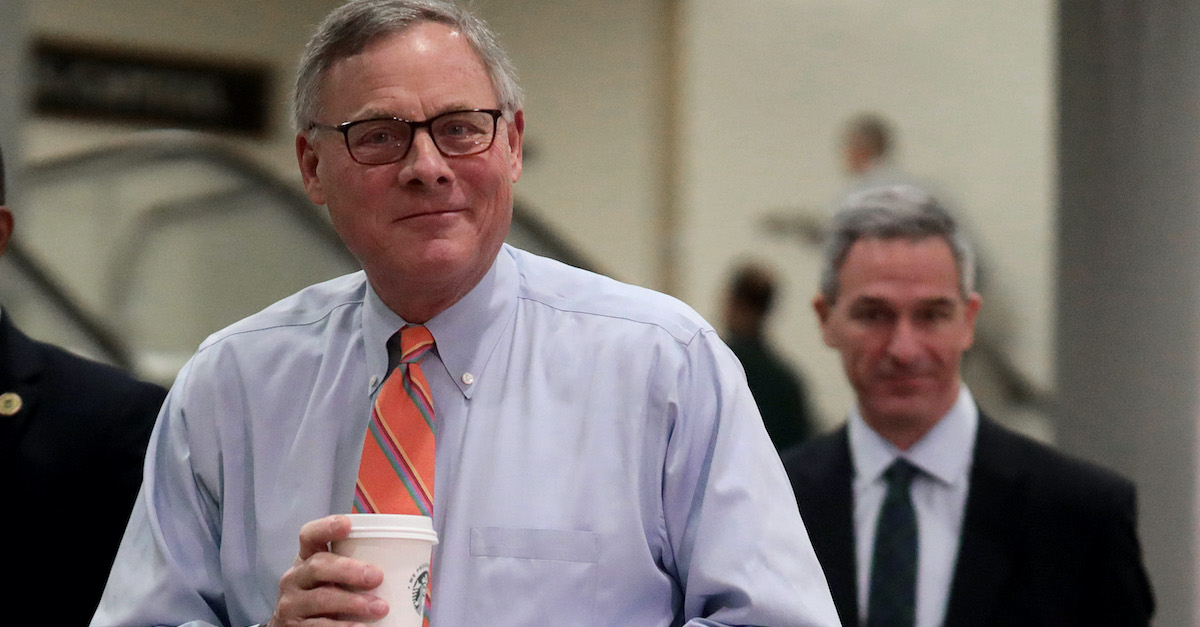
Following reports that Senate Intelligence Committee Chairman Richard Burr sold up to $1.7 million in stock just before the coronavirus pandemic caused markets to crash, the North Carolina Republican became a target of bipartisan ire. Lawmakers and pundits on both sides of the aisle called for his resignation and for an investigation into possible insider trading. While the Department of Justice, the Securities and Exchange Commission, and Federal Bureau of Investigation are reportedly looking into whether Burr traded stocks based on information derived from confidential security briefings, the general consensus of legal experts appears to be that that it would be difficult for prosecutors to bring a viable case against Burr.
There is little debate among them over the question of whether Burr’s conduct was unethical. At a time when Burr was receiving daily security briefings about the looming pandemic and warning wealthy donors to prepare for dire economic straits, he was also reassuring the general public that the U.S. was “better prepared than ever before” for such a crisis. Several other lawmakers’s trades raised questions (see: Georgia Republican Sen. Kelly Loeffler , California Democrat Sen. Dianne Feinstein (D-Calif.) and Oklahoma Republican Sen. Jim Inhofe).
However, compiling enough evidence to prove that Burr’s trade ran afoul of federal law would be problematic.
“It stinks to high heaven,” Duncan Levin, the former head of the Manhattan District Attorney’s financial crimes unit told Vice News. “Unequivocally, without a shadow of a doubt, there’s enough here to say that they may have broken the law. But such a case is much more complicated to actually bring than you’d think by reading Twitter.”
Much like corporate executives, members of Congress are proscribed from making securities trades based on non-public information obtained through their official positions. But, as professor Jonathan Turley of George Washington University Law School wrote Monday, the nature of the information at issue is particularly significant.
“Insider trading cases are hard for prosecutors to make against members of Congress because the law was designed to punish corporate officials who trade stocks by using proprietary information,” Turley wrote on his blog. “Members of Congress do not deal with proprietary information held by company executives and, even with the broader definitions applied by the courts, it would be very difficult to use the legal language to fit legislative profiteering.”
The so-called STOCK Act of 2012 sought to limit insider trading in government, but critics say it didn’t go far enough.
Essentially, even if Burr was convinced to sell his stock based on what he was told in a confidential security briefing about the coronavirus – which had already been ravaging nations on the other side of the Atlantic — that same information could already be found through public media outlets. It’s a stark contrast to the hypothetical case of a corporate executive making trades based on a pending merger only they and a few others knew would soon be happening.
Asked whether there was any information Burr could have learned from a confidential security briefing on the impending pandemic that could potentially form the basis for an insider trading charge, Turley remained skeptical.
“That is a fair question and one that the FBI is likely drilling down on,” Turley said in an email to Law&Crime. “Burr clearly could have information on the severity of the expected health and even market responses, but as a criminal defense attorney, I fail to see a prosecutorial case. First, the extension of insider trading law to Congress is itself problematic for prosecutors. Politicians act on a myriad of different information sources. This is not the classic proprietary information model of insider trading cases. Second, in this case, there was ample independent public information in February to trade stock. Many people were acting proactively in dumping stocks. Finally, the problem is that it is lawful for members to trade stock. They are not required to act behind a trading wave. The problem is not criminal but ethical. Members have resisted the call from some of us for mandatory blind trusts for decades.”
Former federal prosecutor Elie Honig, a CNN legal analyst, agreed that even under normal circumstances, insider trading cases are particularly demanding, but said building a case against Burr was far from impossible.
“There’s a lot we don’t know, but the key question would be did he trade on material non-public information,” Honig told Law&Crime. “To answer that, investigators would have to try and put together what went on in those briefings and look into Burr’s communications and interview witnesses. If you learn he left one of those briefings and sent an email or told someone, ‘Hey, I just got out of a security briefing and you’re not gonna believe what I learned,’ that would be significant.”
Honig also said Burr’s defense of his conduct was unconvincing.
“He said that despite receiving daily confidential security briefings, his stock trades were based solely on publicly available information. That means he would somehow have to build a partition in his mind separating public information from what he learned in security briefings and then only use the information on one side of the partition,” he said. “That would require some serious mental gymnastics.”
[Image via Mark Wilson/Getty Images.]
Have a tip we should know? [email protected]